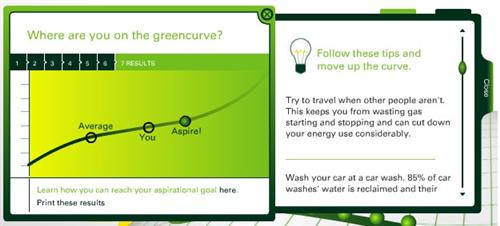
I’m really, really sorry. I had no idea at all that I was living a terrible life, but it took those folks at BP to pull me back into the real world. According to their Greencurve there’s so much more I could be doing to make my life greener. Look at the graph (sorry “curveâ€) above and you can see I’m nowhere near “Aspire!†— whatever that means. I must be re-educated by BP.
Here’s what they say I should do to be greener (and my feelings):
“Try to travel when other people aren’t. This keeps you from wasting gas starting and stopping and can cut down your energy use considerably.â€
(But I almost never drive — there was no option for going everywhere by foot, bus or train.)
“Wash your car at a car wash. 85% of car washes’ water is reclaimed and their systems are much more efficient than ours.â€
(I never wash my car; the rain does it for me. It uses no energy and wastes no water.)
“For outdoor lighting, use solar. It’s easier to find than you might think (on most home and garden furnishings websites, do a search for “solar lightingâ€)â€
(But…but…I don’t have any lights in my garden.)
“Start a recycling program in your neighborhood, local community center or school — anywhere a lot of paper is used.â€
(Please sir, my council already do collect my recycling, and I don’t produce much waste anyway. And what about everything apart from paper?)
Gosh, how castigated I am feeling.
This is what is known as “conchoice†— consumer choice with the emphasis on the “conâ€. As I write in A Matter Of Scale:
Consumer choice would be far better entitled “Conchoiceâ€, a term describing the true level of choice that individuals are provided with, should they find themselves within the consumer culture. Benjamin R. Barber puts it like this: “The apparent widening of individual consumer choices actually shrinks the field of social choices…For example, the American’s freedom to choose among scores of automobile brands was secured by sacrificing the liberty to choose between private and public transportation. This politics of commodity…offers the feel of freedom while diminishing the range of options and the power to affect the larger world.†The individual is being conned: there is no choice.
Look at the way you are currently living: you can “choose†between plasma, LCD, cathode ray tube or Internet TV, but not having a television is inconceivable to most people in the consumer culture; you can “choose†between shopping at Walmart, Aldi, Tesco, Carrefour or any other supermarket, but not using a supermarket is impossible for hundreds of millions of people who need to buy food and have no way of growing it themselves.
How much of your life was simply picked off the shelves of the Conchoice Mall, and how much of it came out of a conscious decision to live in that particular way?
I recommend you try out the Greencurve yourself, and have a think about the “choices†BP are presenting to you. This is not BP’s world, it is your world, and you can make your own choices, regardless of what a polluting oil giant might think. Tell them where to stick their “Greencurveâ€.
Gah, this thing was horrible! I kept looking for the “I ride my bike to work” option, or the “I don’t even own a dishwasher” option. Spot on Keith, spot on. BP can suck it, if this is the kind of future they want, I want to have no part of it.
I am further down the scale than you are. Much like you it asks me to use a car wash, solar lights, start a recycling program, etc.. when I rely on the rain, have no outdoor lights (we have and support dark sky covenants in our neighbourhood) and have the best provincial recycling program in the region…
The fact that I am building a strawbale home from local materials on land that was once industrially farmed and is now healing, that I work everyday helping people make their homes more efficient, that I try to disconnect from consumerism whenever possible, that I have eliminated plastic from as many places as possible in my life and that I am conscious of as many impacts my actions have on my local habitat as I can were not options in their questions.